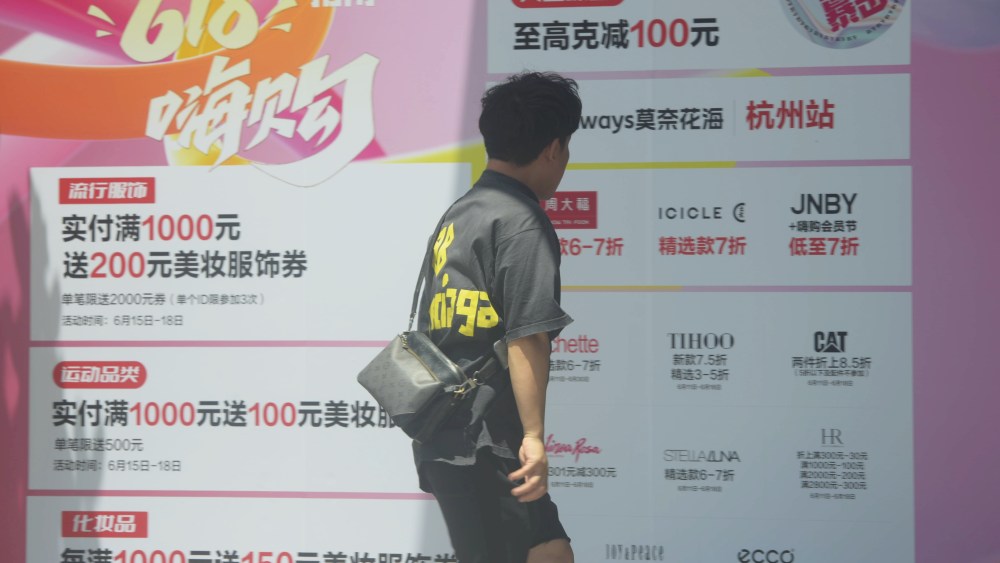Shanghai — A key barometer for retail trends across China, this year's 618, the month-long shopping festival that ended around June 18, was decidedly lackluster. Big names like Alibaba and JD.com dropped slogans like “the biggest 618 ever,” and livestreaming star Austin Li couldn't help but say, “Sales haven't been easy.”
To be sure, online retail is recovering steadily: The latest official data showed that online retail sales surged 12.4% year-on-year to about 5.77 trillion yuan ($795.1 billion) in the first five months of the year.
However, third-party data showed a disappointing 618. According to data from Syntun, a Chinese third-party data agency, the combined sales revenue of Tmall, JD.com and Pinduoduo reached RMB 571.7 billion, down 6.9% year-on-year. Among the three, Tmall ranked first, followed by JD.com and Pinduoduo.
According to Xintun, home appliances, skincare, cosmetics & fragrances, and personal care products were the top three sales categories on major e-commerce platforms in 618, with sales reaching RMB 75.6 billion ($10.4 billion), RMB 26.1 billion ($3.5 billion), and RMB 9.1 billion ($1.2 billion) respectively.
“The data we're seeing points to strong consumer sentiment across a broad range of subcategories, meaning consumers are still willing to spend, just with less 'enthusiasm' than in past years,” Cook said.
According to Sintung, more than a third of its revenue came from livestreaming, reaching 206.8 billion yuan.
According to Syntun, Douyin has become the largest livestreaming retail platform among the big three.
Livestreaming is a popular form of retail during the COVID-19 pandemic, completely changing consumer behavior. For most luxury brands, livestreaming also serves as an intimate and interactive online showroom. On Douyin, Net-a-porter, which recently revealed plans to exit the Chinese market, is using livestreaming to liquidate inventory at deep discounts.
Burberry used livestreaming to offer modest discounts, with broadcasters offering “10,000 purchases for free” [renminbi]Get “500 Off” during our live stream.
For megabrand Louis Vuitton, livestreaming offered a new opportunity to offer personalized retail services in the form of virtual VIP rooms on WeChat. Customers could sign up for 30-minute sessions for a one-on-one shopping experience, which quickly caught the attention of Chinese netizens and even became a trending topic on Weibo.

Screenshots from Burberry’s livestreaming session on Tmall. Screenshots from Self-portrait and Net-a-porter’s Douyin livestreaming session.
screenshot
For many luxury brands, this year's 618 felt like a massive clearance sale, which was far from ideal.
“The new strategy of Chinese e-commerce platforms is focused on discounts and value, which is clearly at odds with the goals of luxury brands, who joined these platforms to increase exposure to new consumers and introduce Chinese consumers to their world of brands well beyond the retail store,” said Jack Roizen, managing director of research and consulting at Shanghai-based marketing firm Digital Luxury Group.
However, Roizen believes brands can still be successful on Tmall and JD.com, but to do so, they “just need to be more rigorous about maintaining a quality brand presence on these platforms,” he said.
“The main challenge will be to resist short-term revenue boosts from promotional activities that could erode brand value,” Roizen added.
Another change for this year's 618 is the elimination of the pre-sale period that usually lasts a week or more. The shift in strategy was aimed at encouraging more spontaneous purchases, according to Cook, who is CEO and founder of Beijing-based e-commerce consultancy WPIC.
“Previously, platforms and brands had complex promotional mechanisms and prices would fluctuate during sale periods, which consumers were happy to track to secure the best price. Brands would not only use these months to clear inventory at discounted prices, but also to launch new products amid a consumption surge,” Cook explained.
“However, today's consumers don't want to pre-order and then wait a week or more for the transaction and shipping to be processed, so canceling pre-orders is the smart move,” he added.
Another reason for increasing direct discounts on Tmall and JD.com is to provide a defensive measure against aggressive players such as Douyin and Pinduoduo.
According to Azoya data, Douyin e-commerce sales in the first quarter of 2024 grew 50% year-on-year, Kuaishou e-commerce recorded 28% growth in the same quarter, Pinduoduo grew nearly 30% in the first quarter, and Taobao's total transaction growth in the first quarter hovered around 10%.
This year, Douyin and Pinduoduo soft-launched similar automatic price adjustment systems that guarantee the lowest possible prices.
Changing algorithms also mean the realities of e-commerce will become more difficult for small businesses.
“Traffic will be concentrated around products with high deal potential and top merchants,” said Dave Huang, Azoya's director of business development.
But smaller retailers are still jumping on board, and joining 618 means they have access to more consumer data.
“One beauty brand founder noted that Tmall has made major changes to its business intelligence tools, offering them for free during promotional periods and allowing for better data collection,” Huang said.


